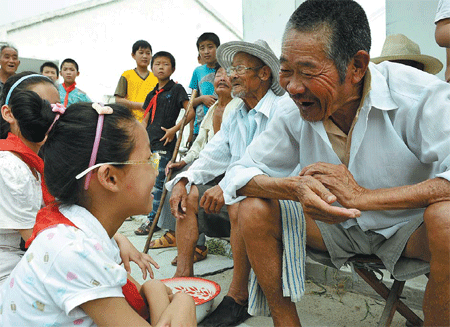新修訂的《老年人權(quán)益保障法》7月1日起實(shí)施,其最受關(guān)注的內(nèi)容是明確規(guī)定了與老年人分開(kāi)居住的家庭成員,應(yīng)當(dāng)經(jīng)常看望或者問(wèn)候老年人,否則將構(gòu)成違法。
請(qǐng)看《中國(guó)日?qǐng)?bào)》的報(bào)道:
 |
|
A student from Wangji Primary School in Jiangsu province chats with an elderly man on Sunday. More than thirty students visited the home for the elderly as part of the "filial morality comes first" program. [Hong Xing / for China Daily] |
The law was passed to protect the lawful rights and interests of parents aged 60 and older, and to carry on the Chinese virtue of filial piety.
該法的通過(guò)是為了維護(hù)60歲以上老年人的合法權(quán)益,并傳承中國(guó)傳統(tǒng)的孝道。
Filial piety就是“孝道”,由儒家創(chuàng)始人孔子提出,并提倡“百善孝為先”(filial piety is one of the virtues to be held above all else),強(qiáng)調(diào)照顧、尊敬并順從父母之責(zé)(the responsibility to care for, respect, and obey parents)。
新法規(guī)定,家庭成員應(yīng)當(dāng)關(guān)心老年人的精神需求(psychological needs),與老年人分開(kāi)居住的家庭成員,應(yīng)當(dāng)經(jīng)常看望或者問(wèn)候老年人(visit them or send greetings on a regular basis),也就是“常回家看看”。新法同時(shí)指出,國(guó)家將把老齡人口(aging population)問(wèn)題作為長(zhǎng)期國(guó)策(long-term national strategy)的一部分來(lái)應(yīng)對(duì)。
相關(guān)閱讀
以房養(yǎng)老 house-for-pension scheme
(中國(guó)日?qǐng)?bào)網(wǎng)英語(yǔ)點(diǎn)津 Helen)
點(diǎn)擊查看更多新聞熱詞
